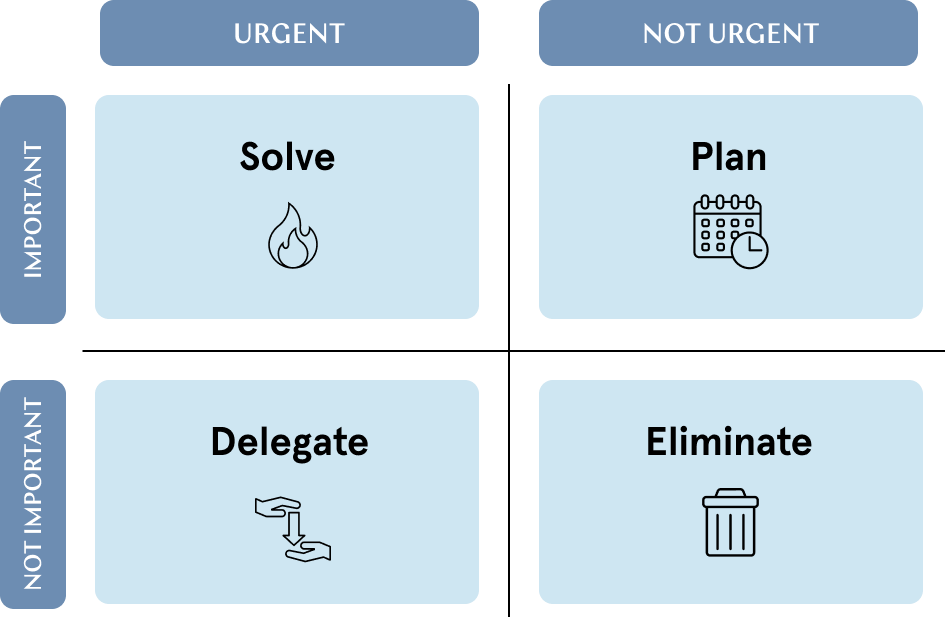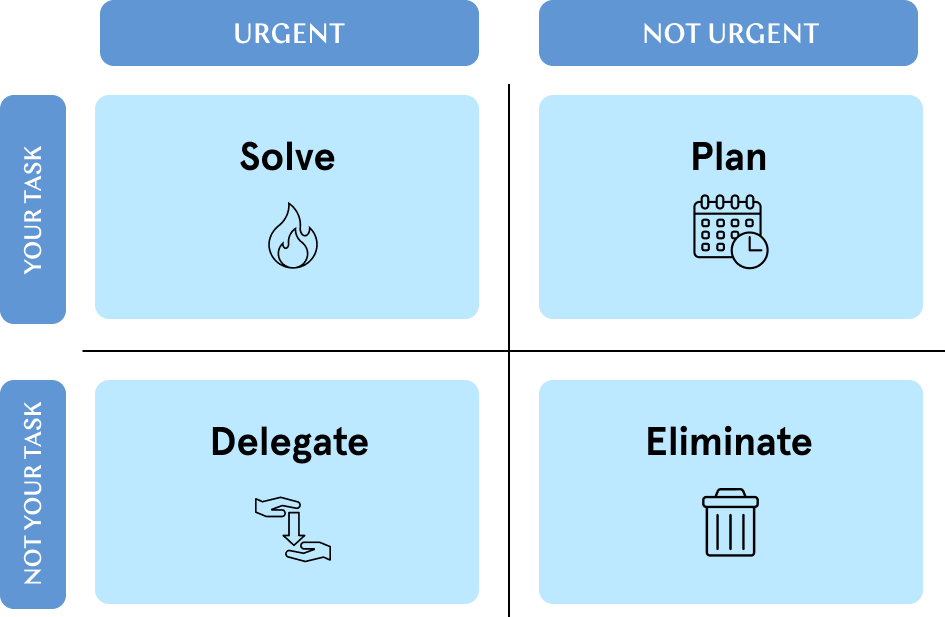Leverage Weekly #69 - Sorting tasks
tl;dr - Do, plan, delegate, or, sometimes, let tasks just drift away
There is a famous system or method, known as the “Eisenhower principle,” according to which one can sort tasks into four types: (1) important and urgent, (2) important but not urgent, (3) unimportant and urgent, and (4) unimportant and not urgent. This system, apparently inspired by a remark made by U.S. General Dwight D. Eisenhower, is incorporated into various self-help systems, including The 7 Habits of Highly Effective People.
The Eisenhower principle yields a 2x2 grid, with each square in the grid corresponding to one of the four task types. There is then a recommendation for each. If the task is important and urgent, do it. If the task is important but not urgent, plan for it. If the task is urgent and unimportant, delegate it. If the task is unimportant and not urgent, eliminate it.
This system likely helps some people with time management. Otherwise, it would be difficult to account for its popularity. The main focus is usually the quadrant in the upper right. People find themselves inundated with urgent tasks, both important and unimportant, and never manage to get around to the important tasks that aren’t urgent. If one can effectively delegate and eliminate unimportant tasks, it is argued, one can do the remaining urgent tasks and still have time to plan.
Setting aside time to think and plan is great advice. Important tasks that aren’t urgent now can turn into a multitude of new urgent important tasks later if the relevant steps aren’t taken. Doing important non-urgent tasks is an absolute necessity, one that many people don’t invest enough time in.
Despite coming along with some great advice, the above 2x2 matrix has a major downside. The downside is that the bottom row doesn’t exactly make sense — at least, not in an organizational context. Consider the lower left quadrant, “not important and urgent,” where the recommendation is “delegate.” If it’s not important, it’s probably not urgent either. And why would you delegate an unimportant task? Why not just eliminate all of the unimportant tasks?
The answer is that the Eisenhower principle can be revised. Instead of “important” vs. “unimportant,” we can substitute in “one’s task” and “not one’s task.” Then, if a task is yours and urgent, do it. If it is yours and not urgent, plan for it. If it is not yours and urgent, make sure someone else does it. If it is not yours and not urgent, let it float away into the mist. This proposal yields a new 2x2 matrix:
One might have two concerns about this revised matrix. The first is just a general caution: when something has been in use for a long time by many people, that might be because it works, i.e., “if it ain’t broke, don’t fix it.” In some cases, however, even ancient and venerable frameworks need to be modified and adapted to new circumstances. That’s all that’s happening here, where the focus is organizational effectiveness, rather than personal effectiveness.
The second concern is with simply letting go of tasks that are not urgent and not one’s own. Shouldn’t they be delegated to someone? The answer is that if a task really isn’t urgent, someone else will find and pick it up. If one is worried no one will eventually pick it up, there’s another task, which is finding a responsible person for that area. That task may or may not be urgent, but it will be important. On this line of thought, one can actually let go of certain tasks. It’s hard to learn to trust, but it pays, in both personal and organizational effectiveness.
Do, plan, delegate, or, sometimes, let tasks just drift away.
The main focus has continued to be quantum biology, even as the Q3 2024 Leverage retreat approaches. The team continued supporting the Quantum Biology Institute; Geoff did a short presentation on prioritization and Melinda helped Jen with setting up HR.
Outside of QBI, Geoff and Oliver have now taken on the challenge of writing papers in quantum biology. The first paper, for which Oliver designed a new document format, is on avian magnetoception. Do birds navigate using the Earth’s magnetic field? Many believe so, and for some quantum biologists, it’s a key piece in their arsenal. Geoff started on a drafting of the paper, incorporating research Oliver had done in previous weeks. This will be a good test of the team’s ability to master a new field quickly.
Leverage’s contractors continue to do a great job. Cliff’s research into mechanisms behind weak magnetic field effects in biology yielded a potentially novel suggestion, which the team has nicknamed “Sandlin modulation.” It’s not a quantum biological mechanism, but it is extremely cool. Anna, who is assisting QBI, has been building out relationships with key collaborators. Her experience fundraising and ability to drive progress has been a fantastic asset.
Otherwise, Geoff and Oliver produced a Leverage Monthly and Melinda planned the logistics for the upcoming retreat. It will be great to have an opportunity to step back and take stock.
Note: This Leverage Weekly covers the week of June 2-6.



